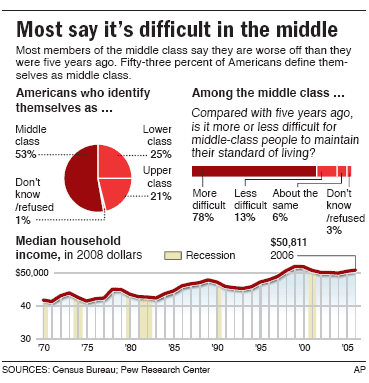The Oneida Middle Class
Are we doing right by our middle class?
By Vince DelaRosa
Oneida, WI - Across the United States there is a great debate occurring around where the wages and jobs are heading for the middle class, and I see some disturbing trends.
There is a shifting employment landscape in America; some have concluded that America's workforce is splitting into high and low-paying jobs. The middle-income demographic is disappearing. This is a phenomenon which leads a lot of people to believe that the middle class in America is under attack.
One recent set of numbers lays out a terrible national factoid which should make all of us take notice, and that is that 400 rich people, most of whom benefited from the multi-trillion dollar taxpayer "bailout" of 2008, now have as much money and are worth more than the combined assets of 155 million Americans. 400 people with more net worth than 155 million people combined. This is a staggering statistic, it shakes you to your core and it's just not right.
Are the economic systems broken in America? Not sure, but they're sure on shaky grounds. Is it ok for a disproportionate amount of insiders to be running wild over the middle class people? In America it seems, the real wage earners, the workers, they're getting the short end of the stick, or the shaft as some would call it.
I will note, it is well documented that a lot of these 400 people were making money off of our misery when our worthless 401 (k's) took a major nose-dive in 2008. 400 people waltzed into the winners circle. Now many of them are arguing how they should be making more. Many of them want tax breaks while a lot of state government's are looking to use union busting tactics so they can supposedly balance budgets. All of the wealth grabbing in 2008 was going on while millions of us were losing our homes and many today are now swimming in waist-high debt.
Today, you have people on the national scene talking about why the party for them should go on. Should we tell them that the music has stopped for many of us? Many of these same people who have benefited from the nation's financial collapse, they want more. Look at what Governor Scott Walker is doing, trying to supposedly balance a budget on the backs of workers, while big business gets tax breaks in the millions. The Governor's phone call with someone whom he thought was a wealthy supporter, the Koch brother, illuminated what the Governor's real intent is.
On the national level, think about this, some Wall Street types (and their business friends) make over a billion dollars a year – each year. These are some of the same people that are saying they need more benefits and tax breaks. How much is a billion dollars? How can you visualize an amount of money that high? Here is one way to think about it: The median household income in the U.S. is around $29,000, meaning half of us make less and half make more. If you make $29,000 a year, and don’t spend a single penny of it, it will take you 34,482 years to save a billion dollars. Over 34 thousand years! The average life expectancy is what; 70 to 80 years? We are screwed. Being average in this country might not work out for some of us. Commodity cheese may be in some of our futures, and not by choice.
I really see some similar things, on a smaller scale, happening in Oneida and it makes me wonder how much is enough from some in management. If you make $80 or $90,000.00 or more dollars a year, and you're at General Tribal Council (GTC) meetings saying you deserve this, what is at play here? Is this a power-play, is this someone who is not aware that resources only go so far, or is this just greed? There are people here in Oneida that need assistance, there are many homeless an unemployed Oneida's.
Now think about this, it appears to me that Oneida might be operating under a horizontal axis pay scale, where we go from low-income jobs, to high-income jobs, and the valley in the middle is the eroding middle class wage earners. In Oneida, most of the employees fall into the lower middle class wage earner spot. The Oneida middle class are the people that make the money at the casino and run all of our various programs. These are the people we see when we receive any service from the tribe. The middle class in Oneida is all of us, and then we have a few high paid people. It's believed we have around 60 to 80 high paid people.
The phenomenon of "median income stagnation" — the weak pay increases for middle-of-the-spectrum earners — has been around for years here, and for decades on the national level. The ironic thing here is the people that earn the money for us, these are all the middle class workers. The middle class Oneida's are the bread winners here, not the high wage earners.
Management at the top doesn't make any money, they spend money. Ironically, the high wage earners here are paid at a far better rate than the Oneida's who are making the money and providing the services, is something wrong with that picture?
Another problem we have here is, as I was preparing this article, I wanted to break down certain sectors of the pay system and exhibit to the Oneida people some real stark examples of what is occurring around our wage system, but the system is a secret. I cannot access the system. Your wage system here in Oneida is kept completely in the hands of only a few people; it's a big secret for some reason.
Today there is no leadership on this issue. There are no cost of living adjustments, there is no pay raises and there is no safety valve, nothing. When you look at who did not support the employee's in the past and who did not support the employee's at the GTC wage petition meeting, it speaks volumes about the priorities of the current Oneida Business Committee (OBC). I have a link at the bottom of this article which speaks to some of these wage issues.
In Oneida there are two emerging issues (Bonuses and Wages) which are at the heart of all of this, and neither subject has been addressed properly. For example, at the last wage petition meeting, there were actually some people in management - at that meeting - talking about why they deserve to be making the money they're making (over $1,900.00 or more a week), while also opposing your employees raises. This was amazing to learn about this. I also looked at the minutes from the meeting and I could not believe what transpired at that meeting. A few management types opposed your wage increases - right in front of you guys - the employees.
Amazingly, they opposed the employees wage increase petition from the GTC, while some in management are now advancing a call that says: "If there are cuts to be made, we should all get cut equally." These are the same people who are not being paid equally; they are making far more than most employees. In fact, some of these people make more than 5 to 8 times what one (1) Oneida makes! Further, some of these people make more than six Oneida families combined, does that sound familiar? Not as dramatic as the 400 to 34,482 numbers above, but you get my point, the system needs to be leveled out.
When someone who is making way more money than you says, "Cuts should be made equally," while they earn a salary which is far superior to yours, don't listen to that person. There is nothing equal about what is going on here for the Oneida middle class. Remember the American example above, some people just want more money and sometimes enough is never enough!
Management appears to be running a slight-of-hand game on the employees. Sadly, the OBC is allowing this to happen. Indirectly, the employees and the GTC are also allowing this to happen. This occurs when we approve a budget at the budget meetings. Why are we approving budgets which do not protect the interest of the employees? When you approve a budget with no raises for yourself, you are condoning what's going on here. The employees have to be heard at the next budget meeting.
It's worth noting, many employees are 8 to 10% or more down in earning and buying power because of the lack of raises over the last few years. Management this year is going to offer a reported 1.8% raise to employees. These across the board wage increases need to stop. This is a disproportionate raise distribution method. The higher wage earners are gathering more in wage increases then the lower wage earners in this system. An across the board pay increase scenario satisfies short-term, but long-term it creates a real disparity between wages because the higher wages gather larger increases. This is simple arithmetic. I addressed this in a petition some 10 years ago, but I guess we haven't learned our lesson.
The people who really earn the money around here, the middle class, I argue they should be getting the bulk of the raises. To me a 1.8% raise is not enough. Moreover, the people at the top of the pay scale, they need to understand that this nation has other challenges. The top wage earners should feel blessed that they've received the wages that they're getting. Today, the Oneida middle class needs some attention.
I think the time has come to have some discussions around wage-caps. Maybe we need to look at freezes for high wage earners, all of these issues need to be considered. We cannot financially turn things around by targeting the lowest paid people amongst us. Look at the employee bonuses that were taken from the employees last year, that's targeting the employees. There has also been talk about taking away personal and vacation days, that's targeting the employees. There has been no pay raises for years, that's targeting employees. If we could eliminate waste here the Oneida middle class could flourish!
A wage cap needs to be considered at some point. Most of these management types have feed long enough from the Oneida financial stream, its time to close the spending down so we can distribute resources out to the people and to the employees, the middle class. The shaky middle class pay situation which is emerging needs to be addressed by the new OBC.
This is all quite amazing. This is the kind of stuff that usually draws thousands of employees to march on governments, like what happened in Madison, WI!
Maybe we can stem the tide in July as we seat a new government. This current OBC is simply out of touch. Look at the last wage petition packet, a majority of the OBC did not support pay raises for the employees. Only the Treasurer, Tina Danforth and Councilman, Ed Delgado supported a pay raise, it's written right in the Budget Packet packet handout from September 18, 2010. Look at pages 60, 61, 62, it's all in writing.
We really need solutions here, we need leaders who will address these wages issues. What we do not need is the sounds of the highest paid amongst saying, "Pay me more, keep paying me more."
We need to turn a new chapter here, both on the wage issues and when it comes to the leadership who is out of touch with the Oneida middle class!
* Here is another article on the issue: TOUCH HERE







